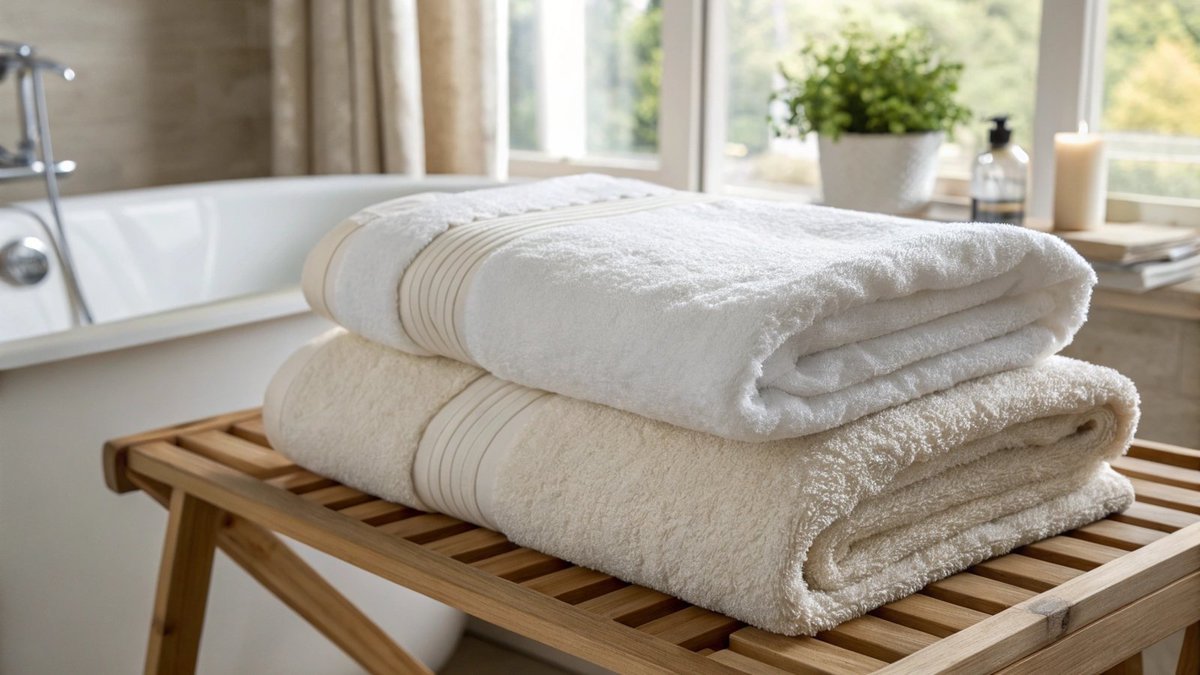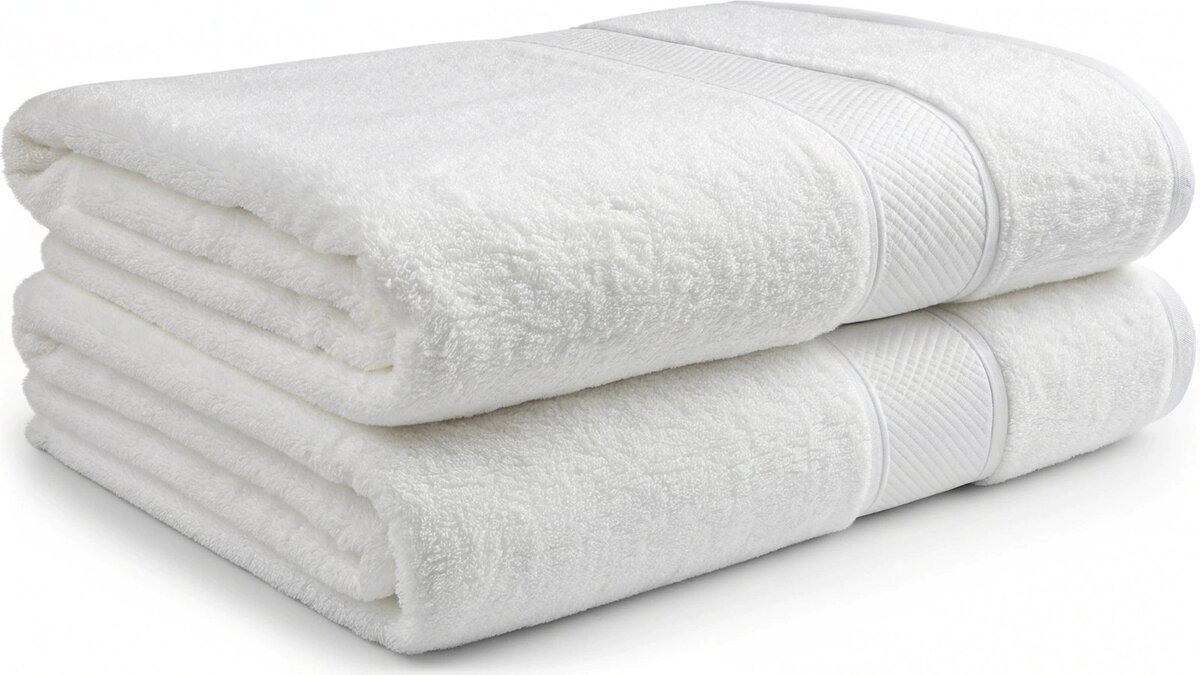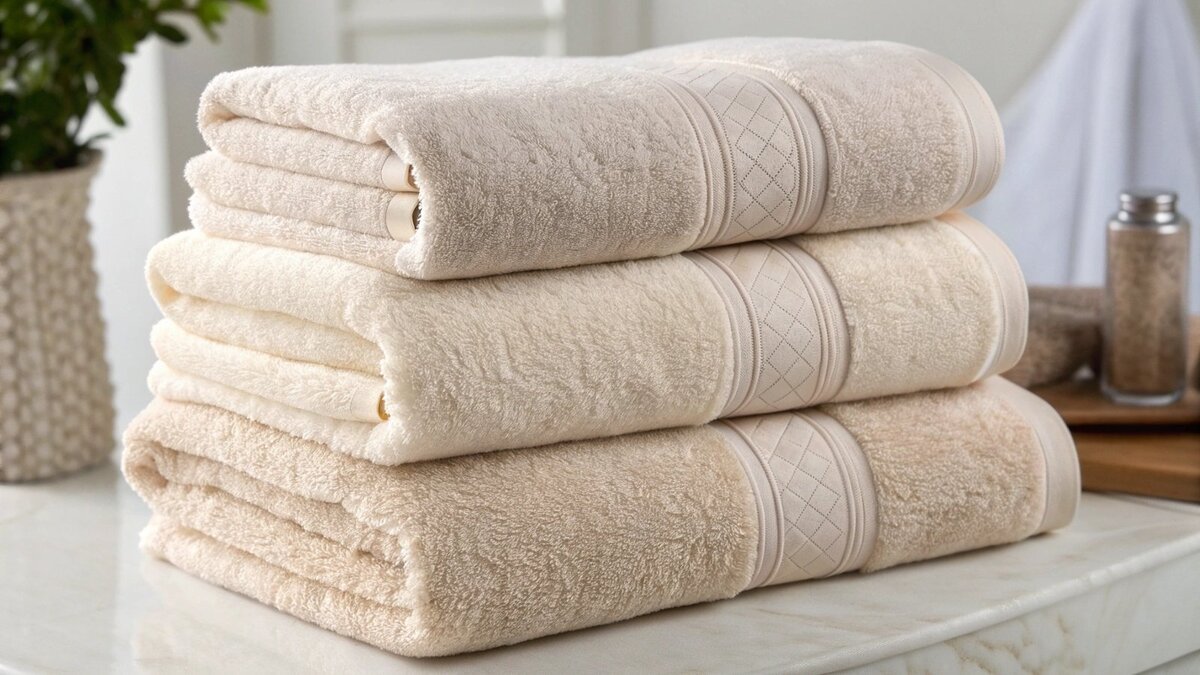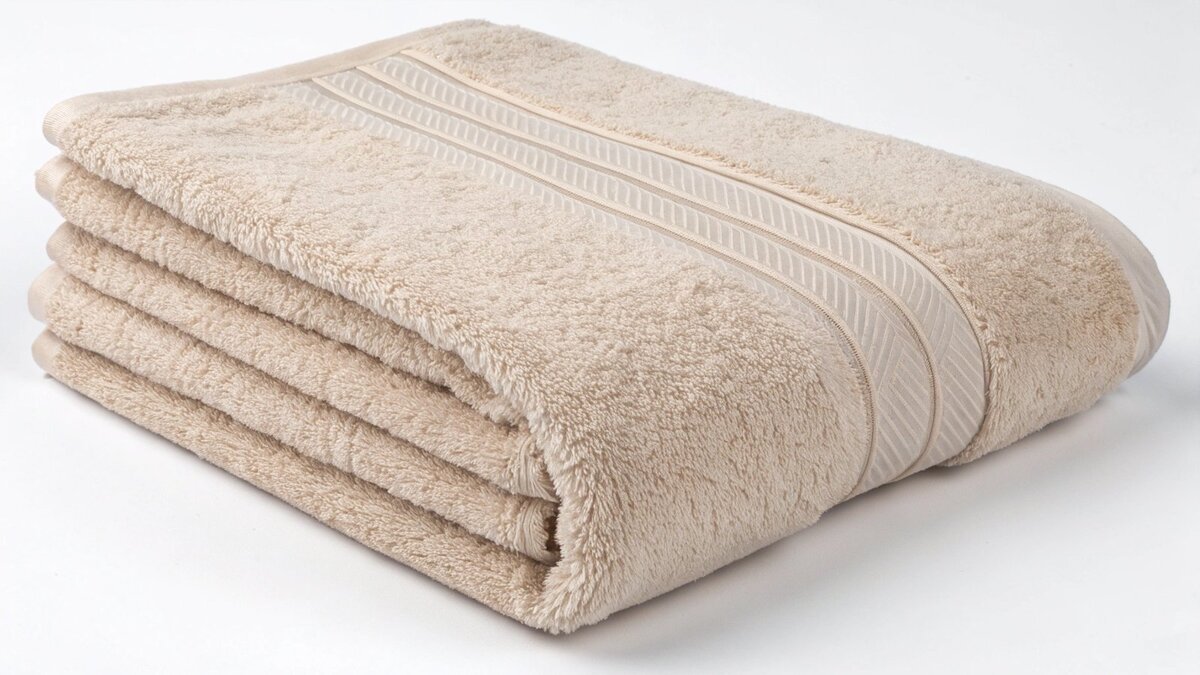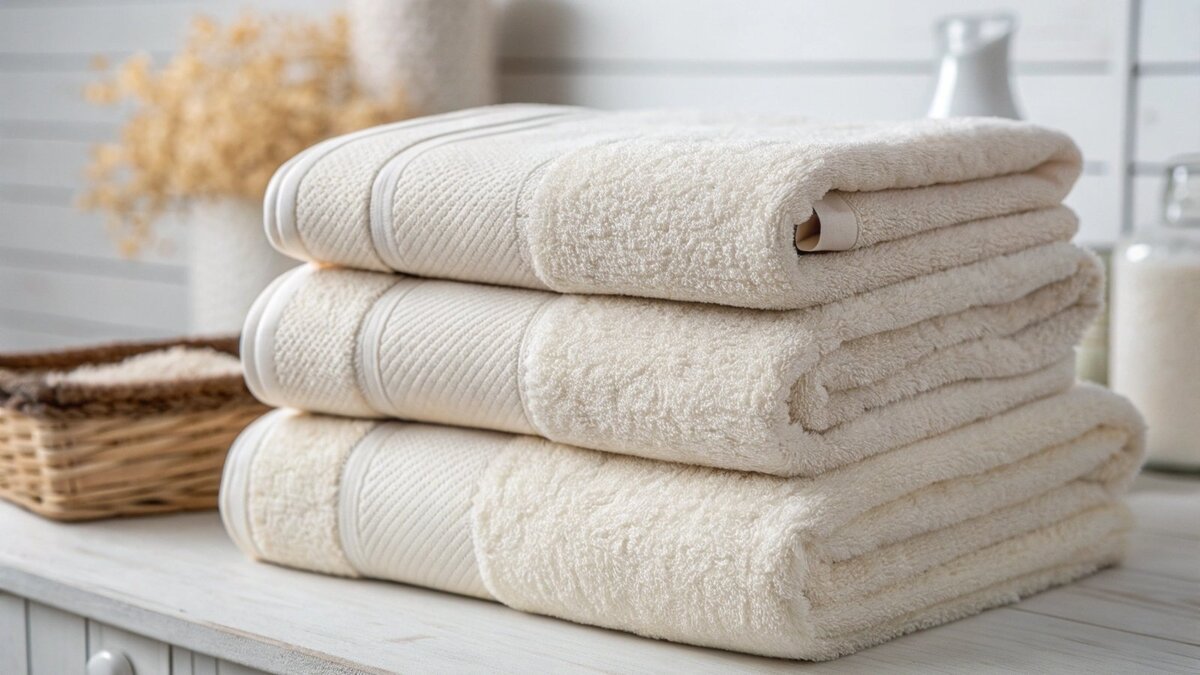Tired of towels that don’t perform? A bad towel choice can hurt your brand’s reputation and leave customers disappointed. Let me guide you through the essentials of a great towel.
A good bath towel is highly absorbent, soft, durable, and dries relatively quickly. The secret lies in the material, like 100% cotton, and its weight, measured in GSM. Construction, such as combed or ring-spun yarn, also plays a huge role in its final feel and longevity.
Choosing the right towel feels like a complex task. There are so many variables to consider, from material and weight to the type of weave. For brands like yours, every detail matters because it directly impacts your customer’s experience. A great towel can create a loyal fan, while a poor one can lead to negative reviews. In this guide, I’ll break down everything I’ve learned in almost two decades in the textile industry. I will help you understand the key factors to confidently select towels that elevate your brand and satisfy your customers, whether you’re starting with a small batch of 500 or scaling up a global launch.
How do you choose a good bath towel?
Feeling overwhelmed by all the towel options on the market? Making the wrong choice can lead to customer complaints and dead stock. Let’s focus on the key specs for success.
To choose a good bath towel, check the GSM (Grams per Square Meter), aiming for 500-700 for a perfect balance of plushness and function. Prioritize 100% cotton and inspect the construction, like double-stitched hems, which signal durability and a longer life for the product.
When I work with clients, the first thing we discuss isn’t color or logo placement—it’s the towel’s core specifications. These technical details are what separate a premium product from a mediocre one. Getting them right is essential for your brand’s reputation.
Grams per Square Meter (GSM)
GSM is the metric for towel density and weight. It tells you how much cotton fiber is packed into the towel. A higher GSM generally means a heavier, plusher, and more absorbent towel. However, it will also take longer to dry. I once had a client who insisted on the lowest possible GSM to cut costs for their gym towel line. The initial savings were wiped out by customer complaints about the towels feeling flimsy and not absorbing sweat effectively. We quickly switched them to a 450 GSM towel, a much better fit for that specific use.
Construction and Durability
The way a towel is put together is just as important as its weight. Look for dense, uniform loops, as this is where the absorbency comes from. The most critical part for longevity is the hem. A quality towel should always have double-stitched hems. This reinforcement prevents the edges from fraying after repeated washing, which is a common failure point I see in cheaply made towels.
| GSM Range | Best Use Case | Key Characteristics |
|---|---|---|
| 300-400 | Gym, Kitchen, Promotional | Lightweight, fast-drying, less absorbent |
| 400-600 | Everyday Bath, Guest Towels | Good balance of absorbency and softness |
| 600-900+ | Luxury Bath, Spa, Hotel | Very plush, highly absorbent, heavy |
What is the best material for a bath towel?
Cotton, bamboo, microfiber—the material choices are dizzying. Choosing the wrong one can disappoint your customers and misrepresent your brand’s quality. So, let’s look at the top contenders.
Without a doubt, 100% cotton is the best all-around material for bath towels. It offers a fantastic natural combination of absorbency, softness, and durability. Premium types like Egyptian or Turkish cotton elevate this further, providing a truly luxurious experience that customers feel instantly.
In all my years at TowelTrend, cotton has remained the undisputed champion for bath towels. Its natural fibers are inherently thirsty and soft on the skin. But not all cotton is created equal. The length of the cotton fiber, known as the staple, makes a huge difference.
The World of Cotton
Long-staple cotton varieties are the gold standard. Their long, fine fibers create yarns that are smoother, stronger, and more absorbent.
- Egyptian Cotton: Grown in Egypt’s Nile River Valley, it has extra-long staples. This creates towels that are exceptionally soft, absorbent, and durable. They are the definition of luxury.
- Turkish Cotton: Also a long-staple cotton, it’s known for being very soft but slightly less absorbent than Egyptian cotton. This quality helps it dry faster, making it a favorite for bath towels and robes.
- Pima Cotton: This is a long-staple cotton grown in the American Southwest. "Supima®" is the trademarked brand name for 100% American Pima cotton, guaranteeing its origin and quality. It is very similar to Egyptian cotton in softness and absorbency.
Other Materials
While cotton is king, some clients have specific needs. Bamboo blends are popular for their silky feel and sustainable story, though they are often less durable than cotton. Microfiber is a synthetic material known for being lightweight and incredibly fast-drying, but it can feel clingy and lacks the plushness of cotton. I usually recommend microfiber for travel or sports towels, not for a luxury bath experience.
| Material | Absorbency | Softness | Durability | Best For |
|---|---|---|---|---|
| Standard Cotton | Good | Good | Good | Everyday value and performance |
| Turkish Cotton | Very Good | Excellent | Excellent | Luxury feel with faster drying |
| Egyptian Cotton | Excellent | Superior | Superior | Maximum luxury and absorbency |
| Microfiber | Excellent | Varies | Good | Sport, travel, and cleaning |
Which type of bath towel is good?
The terms "terry," "zero-twist," or "combed" can be confusing. Picking a style that doesn’t align with your brand’s promise can let down your customers. Let’s decode these types.
A good type is a terry cloth towel made from combed cotton. Terry cloth features the classic loops that make towels absorbent. Combing the cotton before spinning removes short fibers, resulting in a stronger, smoother yarn that produces a superior and longer-lasting towel.
After you decide on a material, the next step is to choose the yarn and construction type. This choice directly influences the towel’s tactile feel—its softness, plushness, and even how much it lints. At TowelTrend, we guide our clients through these options to perfect the final product.
Standard Weave: Terry Cloth
The vast majority of bath towels use a terry cloth weave. This process creates the uncut loops (also called ‘pile’) on both sides of the towel that act like tiny sponges to soak up water. The height, density, and twist of these loops determine the towel’s final performance.
Key Yarn Construction Types
The magic really happens in how the cotton fibers are spun into yarn.
- Combed Cotton: The cotton fibers are literally combed to remove shorter, weaker threads. This leaves only the longest and strongest fibers, creating a yarn that is incredibly smooth and durable. Combed cotton towels feel softer and are less prone to pilling or shedding lint.
- Ring-Spun Cotton: Here, the cotton fibers are twisted together tightly, which creates a stronger, finer yarn. Ring-spun towels have a more luxurious feel than standard carded cotton towels.
- Zero-Twist: This technique is only possible with very strong, long-staple cotton like Egyptian or Pima. The fibers are not twisted at all, which creates large, open loops. This makes the towel incredibly plush, lightweight, and highly absorbent, and it dries very quickly. A new client once asked for "the softest towel imaginable" for their boutique hotel. I immediately pointed them to zero-twist, and it became their signature item.
| Construction Type | Main Benefit | Feel | Linting |
|---|---|---|---|
| Carded Cotton | Value / Economy | Standard | Medium |
| Ring-Spun Cotton | Strength and Softness | Soft, refined | Low |
| Combed Cotton | Ultimate Smoothness | Very smooth | Very Low |
| Zero-Twist | Maximum Plushness | Ultra-plush, airy | Low to Medium |
What is the healthiest material for towels?
Customers today are very aware of what they put on their skin. Using materials processed with harsh chemicals can break that trust. Let’s focus on certified, skin-friendly options.
The healthiest material for towels is 100% organic cotton that is certified by an independent body like OEKO-TEX® or GOTS. These certifications guarantee the towel is free from hundreds of harmful substances, making it safe for all skin types, especially for sensitive skin.
Sourcing healthy, non-toxic products is no longer a niche request; it’s a mainstream expectation. For any brand, especially those in the wellness, baby, or hospitality industries, providing proof of safety is a powerful selling point. This is an area where I’ve seen brands gain a real competitive edge.
Why Certifications Matter
Certifications provide third-party validation that a product meets strict health and environmental standards. They take the guesswork out of safety claims.
- OEKO-TEX® STANDARD 100: This is one of the world’s most recognized labels for textiles tested for harmful substances. If a towel has this label, every component—from the thread to the dye—has been tested and found to be harmless to human health. This is a baseline certification we recommend to nearly all our clients.
- GOTS (Global Organic Textile Standard): This is an even higher standard. GOTS certifies that the cotton was grown organically without pesticides or synthetic fertilizers. It also covers the entire manufacturing process, ensuring environmentally and socially responsible practices.
A few years ago, I worked with a startup launching a line of organic baby towels. Their primary concern was safety. By manufacturing their towels to GOTS specifications and providing the full certification packet, they were able to secure shelf space in several major eco-conscious retailers. The certification wasn’t just a feature; it was the foundation of their brand story.
| Certification | What It Guarantees | Focus Area |
|---|---|---|
| OEKO-TEX® STANDARD 100 | Product is free from a long list of harmful chemicals. | Product Safety |
| GOTS | At least 95% organic fibers; strict environmental and social criteria. | Organic & Ethical |
Conclusion
Choosing the right towel comes down to balancing material, weight (GSM), and construction. Focusing on these key details will ensure you source a product that delights customers and strengthens your brand’s reputation.

